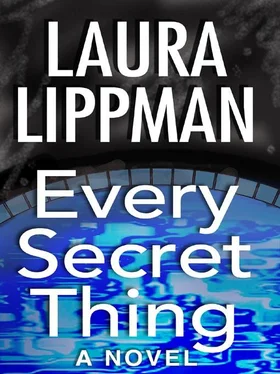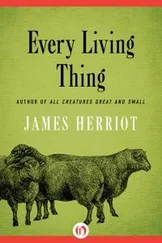“You okay?” Warren asked.
“I’m fine.”
“You’re not eating.”
“Oh, I don’t have much appetite when it’s hot like this.”
“You keep the A.C. so low that you’re wearing a sweater.”
She was, a coral-colored silk cardigan.
“But I was running around today, getting things for dinner. You know me, I can’t just go one place. The produce stand for the vegetables, Nick’s for the fish. They say not to eat fish in restaurants on Mondays, but that doesn’t apply to the fish you buy on Mondays, does it?”
“I hope not.”
The doorbell rang, and Cynthia was up before Warren could push away from the table. The heavy wooden door had a small square with an iron grille. Between that and the tight mesh of the screen beyond, it wasn’t easy to make out the figure on the porch. A white girl, a well-dressed one, whippet-thin and holding a notebook.
Cynthia opened the door only to say: “I can’t talk to you.” The reporters weren’t supposed to come yet. It wasn’t time to grieve just yet.
“Mrs. Barnes? My name is Mira Jenkins and I’m a reporter at the Beacon-Light and I have information that the disappearance of Brittany Little could be tied to the death of your daughter.”
“I can’t talk to you,” she repeated.
“Not even on background?”
Cynthia was amused in spite of herself. The girl was like a mechanical doll, spewing her limited vocabulary. “Do you even know what that means? On background?”
“Well, sure. It means, you tell me if stuff is true, but you don’t put your name to it.”
“And can you use it, then? Or do you have to get someone else to confirm it? Or can you use it but attribute the information to a ‘source’?”
“I-I don’t-Look, you tell me the rules you want to use, and I’ll adhere to them. But I don’t know why you would call my office and tell us about the investigation if you don’t want it in the papers.”
The mechanical doll was suddenly a little less adorable. “What makes you think I called? I haven’t talked to the press for seven years. When I worked for the mayor, I never spoke to the press for the record. Why would I start now?”
“Well, somebody did. Somebody who knew a lot about your case. And then I saw you at the other woman’s apartment yesterday.”
Cynthia looked back over her shoulder. Warren had not come out of the dining room. He was moving through the house, but it sounded as if he were cleaning up, clearing the table, starting the dishwasher. A good habit, one instilled by his mother. His footsteps, the running water, provided cover for her voice.
“I’m going to invite you in now,” Cynthia said. “We’re going to sit in the living room and talk, over iced tea. Well, iced tea for you, wine for me. When my husband comes out to see what’s up, we’re going to tell him you’re a student in the political science department at UB and your teacher recommended you talk to me about city politics. He’ll go upstairs to watch television, read his newspaper. Then-and only then-we will talk about that .”
“On the record?”
Oh, she was a greedy girl. Offered half a loaf, she asked for a whole. Cynthia admired that trait. It was one that had taken her far in life.
“Don’t get ahead of yourself,” she told the girl, using the warm mentor voice that she knew young women loved, the voice that she had used on her office interns. “But if you do what I tell you, exactly the way I tell you, you’ll get your story.”
Alice kept her eyes downcast as she walked, studying the ground. The sidewalks in Ten Hills had buckled in places, swollen by the roots of the huge oaks and elms. The uneven pavement made it easy to stumble here, especially in the gray-green twilight, and Alice hated the sensation of stumbling. It was much worse than falling, when people felt obligated to express sympathy or hold out a hand. Tripping just made you look silly and clumsy.
But Alice was staring at the sidewalk because she didn’t want to make eye contact with Sharon Kerpelman, who had insisted on accompanying her tonight. Her lawyer had arrived at the Mannings’ house at almost the exact moment Alice began scraping the bottom of her bowl with her spoon, chasing the last raspberry drips of what Helen insisted on calling sorbet.
“Just passing by,” Sharon insisted, as if Alice didn’t know where Sharon lived and worked, as if Helen’s guilty bustling with the dishes didn’t prove they had arranged this chance encounter. Which meant that Helen and Sharon had talked, outside Alice’s hearing. Alice did not approve of this. It was one thing for them to set up the meeting with the other lawyer, that ugly woman. But she didn’t want them to get into the habit of talking behind her back. They had done that quite a bit, seven years ago, and Alice still wondered what they said to each other that they would not say to her.
“I usually walk after dinner,” Alice said, with a quick glance at Sharon’s feet. The lawyer was wearing black sandals with low, chunky heels and a complicated welter of straps. “My mother says it’s good for digestion.”
“Great,” Sharon said. “I’ll walk with you.”
Alice could not take Sharon on her normal evening route, of course. But she skirted it, leading her through the outer edges of Ten Hills, where big, rambling houses sat back on large lawns. Once, on a summer night such as this, windows would have been open and sounds would have carried-parents calling children in for the evening, the clink and clank of a kitchen being cleaned after dinner, the buzz of a baseball game. But most of the houses had been renovated and now had central air-conditioning, so the only sound was a steady, bland hum.
“It’s almost as bad as the seventeen-year locusts,” Sharon said. “Worse, because locusts are part of the ecosystem. All these air conditioners are probably making the world warmer.”
“You have air-conditioning, right?” Alice kept her voice mild, as if simply making conversation.
“Well, yes, but I live in a condo.”
“Oh.”
“I mean, these houses were built to take advantage of breezes, to breathe in the summer heat. So you’re fighting the architecture when you put in central air. It’s very inefficient.”
“My mom doesn’t believe in air-conditioning, except in bedrooms. And even then, she tries not to use it. She says it makes mold grow in your sinuses.”
“Huh,” Sharon said. “I suppose it could.”
Alice knew Sharon was trying to find a way to talk about whatever had led to this fake-impromptu encounter. But she wanted it to seem casual, almost an afterthought. Here we are, walking along, and oh, by the way, where were you Friday night before I came over? Really? Do you know where the little girl is? Between us?
“I’m never hot,” Alice said. “I barely even sweat. Even when I walk at midday, I don’t get hot. The secret is not to go fast.”
“Do you get enough water?”
“Sure. I guess so.” She drank three sixteen-ounce Diet Pepsis every day.
“Because maybe the reason you don’t sweat is because you’re not getting enough water. Sweating is the body’s cooling system. I mean, that’s your central air-conditioning, in a way.”
Alice had thought it was admirable she sweated so little, but now Sharon was making her feel as if this was another failure on her body’s part.
“Still, it’s great you’re walking so much,” Sharon said. “You walk at midday and after dinner?”
“Most days.”
“All you do is walk?”
“Sometimes I sit for a while. And I’ve been looking for a job.” She had told this lie so often now that it was more automatic and sincere than the true things she sometimes said.
Читать дальше












